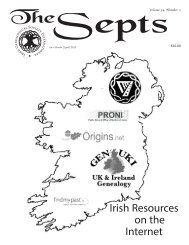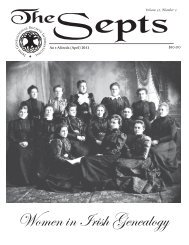(April) 2011 - Irish Genealogical Website International
(April) 2011 - Irish Genealogical Website International
(April) 2011 - Irish Genealogical Website International
You also want an ePaper? Increase the reach of your titles
YUMPU automatically turns print PDFs into web optimized ePapers that Google loves.
_____________________________________________________________ Australian Convict History<br />
Arms and Principal Herald of Ireland dated<br />
18 <strong>April</strong> 1820 followed by various pedigrees<br />
and correspondence from the <strong>Genealogical</strong><br />
Office.<br />
Conclusion<br />
The Sir William Betham collection stands<br />
as one of the greatest genealogical collections<br />
assembled in the nineteenth century.<br />
There are so many valuable extracts and<br />
transcripts of documents that were subsequently<br />
destroyed in the Public Record<br />
Office in 1922 that a researcher can learn a<br />
wealth of <strong>Irish</strong> history, life and culture from<br />
the collection even if precise details to extend<br />
a specific pedigree are not found. Enjoy<br />
the experience and the beautiful examples in<br />
this collection.<br />
David E. Rencher, AG, CG, FUGA, FIGRS,<br />
is Chief <strong>Genealogical</strong> Officer for FamilySearch,<br />
a professional genealogist<br />
since 1977,<br />
accredited in Ireland<br />
research in 1981 and<br />
certified in 2006. He<br />
is the course coordinator<br />
for the <strong>Irish</strong><br />
Course at the Institute<br />
of Genealogy and<br />
Historical Research<br />
(IGHR). He is a<br />
past-president of the<br />
Federation of <strong>Genealogical</strong> Societies (FGS)<br />
and of the Utah <strong>Genealogical</strong> Association<br />
(UGA) and a Fellow of that organization. He<br />
is also a Fellow of the <strong>Irish</strong> <strong>Genealogical</strong> Research<br />
Society, London.<br />
<strong>Irish</strong> <strong>Genealogical</strong> Society <strong>International</strong><br />
Transported Beyond the Seas<br />
By Linda Miller<br />
The judge his sentence then to me addressed<br />
Which filled with agony my aching breast<br />
“To Botany Bay you must be conveyed<br />
For seven long years to be a Convict Maid.” 1<br />
The fact that Australia was founded<br />
by convicts is something that holds a<br />
certain fascination for many of us. For the<br />
eighty years between1788 and 1850, Britain<br />
punished more than 162,000 <strong>Irish</strong>, Scottish<br />
and English convicts by transporting them<br />
to serve their sentences halfway around the<br />
world in New South Wales and Tasmania<br />
(Damien’s Land). About a third of that<br />
group was <strong>Irish</strong> and fifteen per cent were<br />
women. 2 Not all records on transportation<br />
have survived, but estimates on the<br />
number of <strong>Irish</strong> women transported are<br />
in the several thousands. After the policy<br />
of transportation ended, the government<br />
destroyed many of the Australian convict<br />
records but, fortunately, many remain. 3 For<br />
more than a century, Australians tried to<br />
forget about their convict past, but recently,<br />
there has been a resurgence of interest in the<br />
history of the penal colonies and a newly<br />
found pride in the people who founded and<br />
built their country.<br />
The British had a long-standing practice<br />
of transporting convicts. During the<br />
17 th and most of the 18 th century, they<br />
banished convicts and other “undesirables”<br />
by transporting them to the West Indies<br />
and the American colonies, to be sold into<br />
servitude. By 1776, approximately 50,000<br />
<strong>Irish</strong>,Scottish and English convicts had been<br />
left on America’s shores and about 13,000<br />
of them were <strong>Irish</strong>. When the American<br />
colonies won their independence from<br />
England, the British had to find another<br />
location for penal colonies.<br />
Britain did not have a prison system, as<br />
such, because they didn’t really need prisons.<br />
Over 200 crimes were punishable by death<br />
and those who weren’t hung were simply<br />
transported. They found it an efficient<br />
system and often a permanent solution for<br />
eliminating undesirables from Britain. The<br />
English jails generally held those waiting<br />
to be hung and people serving very short<br />
sentences for very minor crimes.<br />
Complicating the lack of a place to banish<br />
convicts,publicsentimentwaschangingabout<br />
the death penalty. People began to realize<br />
that hanging was too severe a punishment<br />
for petty crimes. They demanded change<br />
and the government responded by replacing<br />
most hanging offenses with sentences of<br />
transportation. The result was an increase in<br />
the number of convicts to be transported and<br />
nowhere to send them. Only those convicted<br />
of the most serious offenses, which included<br />
rape, murder, treason, robbery, theft of items<br />
worth more than a shilling, impersonating<br />
an Egyptian and other serious crimes, were<br />
hung. Impersonating an Egyptian 5 had to do<br />
with gypsies. In eighteenth century Britain,<br />
gypsies were thought to have originated in<br />
Egypt. Anyone who dressed like a gypsy<br />
or engaged in certain forms of deception<br />
associated with gypsies, such as palm reading,<br />
was “impersonating an Egyptian.” The rest<br />
– petty thieves and pickpockets, <strong>Irish</strong> and<br />
Scottish rebels,disorderly persons,those who<br />
had tried to start a union, who were absent<br />
from their job without permission, who were<br />
drunks, who suggested that politicians get<br />
paid, or who stole fish from a river or pond<br />
– were transported“beyond the sea”. 6<br />
The 18 th century was a time of enormous<br />
social change. The Industrial Revolution<br />
brought prosperity to Britain but it also<br />
brought increasing crime. The cities were<br />
flooded with people from the country who<br />
came to work long hours for low pay in the<br />
new factories. Even children, beginning at<br />
age six, worked in the factories. It was a time<br />
Page 95




